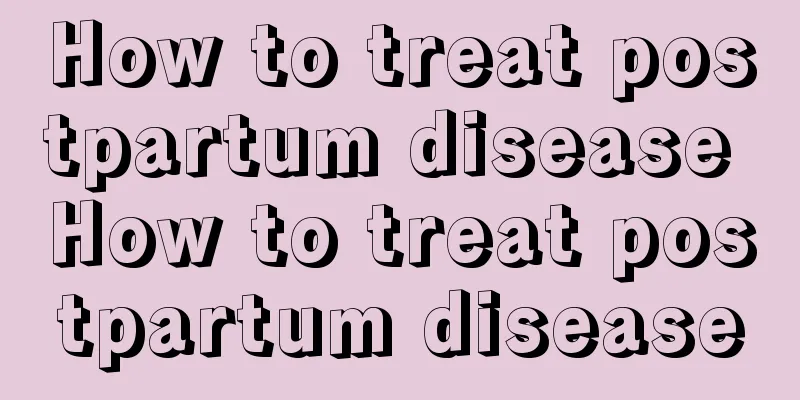How to treat postpartum disease How to treat postpartum disease

|
It is a Chinese tradition that pregnant women should stay in confinement for a month. This period of confinement not only allows the mother to recuperate, but also allows the mother who has just given birth to recover. Therefore, it is very important to stay in confinement for a month. Today I will tell you how to solve some physical problems that occur during the confinement period. How to treat postpartum disease1. Early detection and early treatment. During the "confinement period", no matter what disease you have, you should find it early and seek medical treatment in time. If some women have persistent fever after delivery, you must find out the cause and be alert to possible infection lesions in the body, such as pelvic inflammatory disease, endometritis, mastitis, inflammation of episiotomy wounds or cesarean section wounds, etc. Once diagnosed, effective anti-infection treatment should be carried out in time. If you don't take it seriously and mistakenly think it's a common cold and don't seek medical treatment in time, the inflammation will spread or become a chronic lesion, and the course of the disease will easily migrate, or even be difficult to cure. 2. Symptomatic treatment. Whether you are in normal times or during the "confinement period", you should go to a regular hospital to seek professional treatment. If you blindly seek medical treatment, are keen on folk remedies, secret recipes, or take medicines on your own, etc., it is possible to delay diagnosis and treatment, and turn the disease into a chronic disease. If you have a so-called "confinement disease" such as back pain, you should use comprehensive treatment methods such as drugs, physical therapy, and physical exercise under the guidance of a specialist. 3. Daily diet. Dietary conditioning during the postpartum period is as important as that during pregnancy. Because the mother needs extra nutrition to supplement the consumption of childbirth and breastfeeding. However, in the first one or two days after delivery, the mother should eat light and easy-to-digest food. The diet in the future should be nutritious and provide enough calories. Do not be too full or too hungry, do not eat raw, cold, or spicy food, and do not diet for fear of obesity. Eat more milk, rice bran, bran, carrots and other foods rich in vitamins C, D and B vitamins, increase the proportion of vegetarian food in the diet, and avoid osteoporosis and low back pain. 4. Rest, recuperation and exercise. After giving birth, the mother is very tired, so she should rest in bed for the first two days. Although she rests in bed, she still needs to turn over and move around more often. She can get up to wash and defecate. Before getting up, she should sit up for a while and get out of bed when she does not feel dizzy. If she is healthy and fatigue has been eliminated, she can get up 24 hours after giving birth. As for the amount of activity after getting up, it should be increased slowly. On the first day after getting up, sit by the bed for half an hour each morning and evening. On the second day, she can walk around the room. Then gradually increase the range and time of activity. Postpartum disease and postpartum treatment have two meanings1. If you get sick during the confinement period, you must take the time to treat it. Don’t delay. It will be difficult to treat after the confinement period. 2. If the root of the postpartum disease is left, it will be relatively easier to treat it in the future. However, it should be pointed out that this does not mean that postpartum disease cannot be cured during the non-confinement period. Therefore, there is no need to artificially create an opportunity for confinement to treat postpartum disease. It takes more time (3-5 months) to treat postpartum disease in non-confinement period because the muscles, bones and pores have been closed and the wind and cold have been wrapped in the body, but as long as the cause is found and targeted treatment is given, it is certain to be completely cured. Postpartum disease is easily misdiagnosed as rheumatism or rheumatoid disease. If it is treated as a rheumatic disease, the effect is minimal, or it is effective during treatment and relapses soon after stopping the medication. Postpartum disease is very torturous, so it should be prevented before it happens. Postpartum disease is best treated with Chinese medicine, because Chinese medicine treats it from the root and will eradicate it. Using Western medicine to treat it will temporarily relieve the pain but not eradicate it, and the consequences are not good. It is very easy to become paralyzed when you are old. Medical books say: Women's diseases are ten times more difficult to cure than men's, because women worry more. Three parts treatment and seven parts care, the better the mood, the faster the disease will be cured, so you must maintain an optimistic attitude. Pay attention to the taboos when taking medicine, avoid eating raw and cold food, avoid radish when taking ginseng, and avoid radish and garlic when taking tonic medicine. There is a general principle of taboos when taking Chinese medicine: try to eat neutral and peaceful food when taking warm or cold Chinese medicine. Because the nature and taste of Chinese medicine and food are opposite, it will offset and weaken the effect of the medicine and fail to achieve the desired therapeutic effect. In some cases, the nature and taste of the medicine and food are the same, which will also increase the strength of the medicine on the human body, exceeding the range of the human body, and counterproductive. Note: Patients who have given birth for less than six months should avoid surfing the Internet to avoid hurting their eyes. As the saying goes: If you don't avoid certain foods when taking medicine, you will lose the doctor's hand in vain. You must avoid certain foods when taking medicine. Sometimes the doctor's instructions are not comprehensive, and he doesn't say much about some basic common sense, so patients have to pay attention to it themselves. If you have a weak spleen and stomach, don't eat cathartic foods, such as spinach, milk, cucumber, soybeans and their products, etc. When taking Chinese medicine, avoid eating raw and cold foods, don't eat fruits, and don't drink beverages such as juice. Don't eat foods that make your stomach uncomfortable after eating. In addition, don't eat foods that can detoxify. For example: garlic, mung beans, chrysanthemum tea, honeysuckle tea, etc. Pay attention not to contact with cold water at ordinary times. Even if you get better, you must pay attention to a stage and don't get cold again. It is recommended that patients or their families read more Chinese medicine books and don't rely entirely on doctors. Postpartum disease is a chronic disease, and some diseases still need to be slowly adjusted by themselves. Sometimes a small folk remedy can also cure a serious illness. For example, eating some ginger can cure stomach cold. Just put more ginger in cooking and eat it. You can also fry ginger strips with brown sugar to warm the stomach and relieve gas, which has a good effect. However, you must eat peeled ginger (unpeeled ginger is cold in nature, while peeled ginger is the opposite). Causes of postpartum disease1. Pregnant women exert too much force, sweat too much, and lose too much blood during childbirth. These will lead to physical deficiency and blood deficiency after childbirth. If you are not careful in conditioning at this time, the yin blood will be empty, the yang qi will be scattered, and you will suffer from postpartum disease. 2. Postpartum Qi and blood are deficient, stagnant, and stagnant inside. After childbirth, all meridians are empty, and the internal deficiency is invaded by evil. At this time, the wind and cold are most likely to take advantage of the opportunity to enter. The invasion of cold wind will cause the blood to stagnate, causing Qi and blood to be blocked in the body. If it stays in the body for too long, it will cause blood stasis and cause various diseases. 3. Improper diet after childbirth or injury due to fatigue. The body is weak after childbirth and needs to be conditioned by diet and rest. However, if the diet is improper, it will not only fail to nourish the body, but will aggravate the symptoms of qi deficiency. In general, you need to stay in bed and rest more after childbirth. If you are tired or upset, it will leave the root of the disease. |
<<: Can you tell a boy or girl from the fetal movement? Don't believe this anymore.
Recommend
How to teach a 6-year-old baby who likes to throw toys
My baby is already 6 years old, but he still like...
Can I drink milk powder for pregnant women during breastfeeding? Is it good to drink milk powder for pregnant women during breastfeeding?
Whether it is during pregnancy or breastfeeding, ...
Is it better for the baby to lie down or to be held? How to hold a newborn baby?
Everyone loves newborn babies. So the question is...
How many carnations should be given on Teacher's Day? What color carnations should be given on Teacher's Day?
How many carnations should be given on Teachers&#...
What should I do if my child's replacement teeth don't grow out? How long does it take for a child's replacement teeth to grow new teeth?
Every child will go through the process of tooth ...
Can babies eat overnight meals? Is it good for babies to eat overnight meals?
The topic of overnight food has always been a con...
Do babies need pillows? At what age can babies use pillows?
At what age can babies use pillows? Adults cannot...
Is it normal for a newborn baby to have bent legs? What is the reason for a newborn baby to have bent legs?
I believe that many mothers are looking forward t...
Does everyone have a rebellious period? What causes a rebellious period?
Many parents know more or less about their childr...
Can I eat yam after I get pregnant? Yam can promote fetal development
A few days ago, a pregnant mother asked me if I c...
How to remove crystal mud from hair? What is crystal mud made of?
It’s okay to play with crystal mud in your hands,...
Can children who are picky eaters eat protein powder? Can children who are picky eaters eat lactobacillus tablets?
Children's picky eating is a headache for par...
How to solve lactose intolerance in newborns?
After many newborns are born, the mother's fi...
Can the battery of a Philips electric toothbrush be replaced? How to replace the battery of a Philips electric toothbrush
The battery of an electrical appliance will defin...
Can children get vaccinations for coughs? What are the effects of vaccinations for coughs in children?
Children's cough is often a symptom of a cold...









